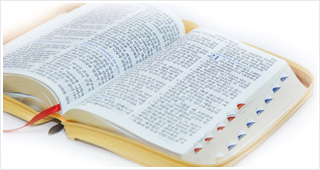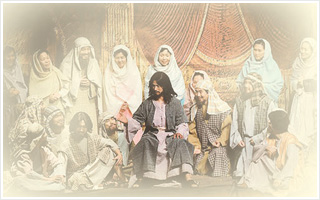[Feature Story] I'd Like to Know the Spiritual Difference between a Lamb and a Sheep
|
|
|
 14688 |
 |
July 01, 2012 |
|
|
|
 Q: In general, sheep symbolize believers, so I thought the lamb, which is a young sheep, must stand for new believers. However, after reading the Four Gospels, John the Baptist said to Jesus, "Behold, the Lamb of God who takes away the sin of the world!" Then, what is the spiritual difference between a lamb and a sheep? Q: In general, sheep symbolize believers, so I thought the lamb, which is a young sheep, must stand for new believers. However, after reading the Four Gospels, John the Baptist said to Jesus, "Behold, the Lamb of God who takes away the sin of the world!" Then, what is the spiritual difference between a lamb and a sheep?
A: The Bible distinguishes between the sheep and the lamb. The 'sheep' stands for believers who are God's children, and the Lamb (capitalized) refers to Jesus, the Son of God.
In John Chapter 21, the resurrected Lord showed up before His disciples at the Sea of Galilee. After having breakfast with them, the Lord Jesus Christ spoke to Peter, His foremost disciple asking, "Simon, son of John, do you love Me more than these?"
Peter boldly answered, "Yes, Lord; You know that I love You." The Lord asked Peter "[to] tend My lambs." And, the second question of the Lord was given to Peter, "Simon, son of John, do you love Me?" Peter answered Him, "Yes, Lord; You know that I love You." He said to him, "Shepherd My sheep." And when the Lord said to him the third time, "Simon, son of John, do you love Me?" Peter was grieved and answered, "Lord, You know all things; You know that I love You." This third time the Lord said to Peter "Tend My sheep."
When Peter professed he loved the Lord, He asked Peter to "tend My lambs" "shepherd My sheep" and "tend My sheep" respectively. What is the difference between the lambs and the sheep?
 1. General Meanings of 'Sheep' and 'Lambs' 1. General Meanings of 'Sheep' and 'Lambs'
A sheep is the meekest of animals. It has no evil and is very obedient. It has no desire to harm, to hit or fight with any other being, even if it has horns. When shearers shear it, it keeps calm without protesting. Sheep recognize their shepherd's voice so that it never responds when anyone else who tries to imitate the call of the real shepherd. It follows only its shepherd's guidance and voice.
Sheep are a great benefit to man. Its meat is tender and tastes good. Its coat is used for cloth and it provides us with milk. People usually mention a sheep in good sense. When we say he is as gentle as a lamb, it means he is gentle in nature. And when we say something is as white as wool, it means it is white, clean and beautiful.
A-year-old sheep unblemished and that has not yet mated is recorded as a 'lamb' in the Bible. A lamb that is white and beautiful in brightness gains much favor from people. The wool is so soft and clean that it is widely used to make high-quality clothing. In addition to the word 'lamb' there are a couple of other expressions such as ram, sheep and ewe. The Bible sometimes differentiates the two words—'sheep' and 'lamb.'
2. Biblical and Spiritual Meaning of Sheep and Lamb
In Psalm 23:1 God is likened to a shepherd and it is inferred that believers are likened to sheep as written saying, "The LORD is my shepherd, I shall not want." Psalm 78:52 says, "But He led forth His own people like sheep" and Psalm 79:13 says, "So we Your people and the sheep of Your pasture will give thanks to You forever." And, in Matthew 10:6 it says, "But rather go to the lost sheep of the house of Israel," and Mark 6:34 says, "He felt compassion for them because they were like sheep without a shepherd." In these verses, we can clearly see the Bible likens people of Heaven, namely God's children and the believers, to 'sheep'.
Exodus Chapter 12 talks about how to eat the lamb. Here, the lamb symbolizes Jesus whom God gave as atoning sacrifice to save His people from sins.
Besides, John 1:29 says, "Behold, the Lamb of God who takes away the sin of the world!" And Revelation 5:6 reads, "And I saw between the throne (with the four living creatures) and the elders a Lamb standing, as if slain, …" In these verses Jesus, who took the cross at the young age of 33, is referred to as 'the Lamb'.
The Bible metaphorically represents Jesus to various things of all dimensions. Among them, in Isaiah Chapter 28 He is likened to 'a stone, a tested stone, a costly cornerstone' which are expressions of the zero dimension. He is the 'vine' which is the expression of that which is of the first dimension in John Chapter 15. In John 1:1 and succeeding passages He is 'the Lamb' which is the expression of that which is of the second dimension; the 'Son of Man', which is the expression of the third dimension; and 'God the Savior, the Creator' which is the expression of the fourth dimension.
Some people say new believers can be called a 'lamb', but this is not in accordance with the biblical teaching.
TIP - Difference between the names of Jesus and Jesus Christ
The name of 'Jesus' means that He will save His people from their sins as written in Matthew 1:21. This sentence is not in the past form but in the future form. Meanwhile, the 'Christ' means 'the One who has been anointed' and refers to the Savior as a Peacemaker and Mediator between God and mankind. That is to say 'a being who meets the qualification of the Savior'. In Greek He is called 'Christ' and called 'Messiah' in Hebrew.
Jesus, the Son of God, died on the cross, destroyed the authority of death, and was resurrected. It was then that He became our Savior. Therefore, it is proper to call Him 'Jesus' before His crucifixion, and to call Him 'Jesus Christ' after His crucifixion and resurrection. The name of Jesus Christ carries the same meaning of 'the Savior' and 'the Lord'.
Preaching the message and praying after the Lord's resurrection and ascension, the Lord's disciples and apostles called Him not just 'Jesus' but they added 'the Lord' or 'Christ' to the name of Jesus (Acts 3:6). Therefore, we must not conclude our prayers with "In the name of Jesus, I pray" but we must say "In the name of Jesus Christ, I pray."
 
|
|

